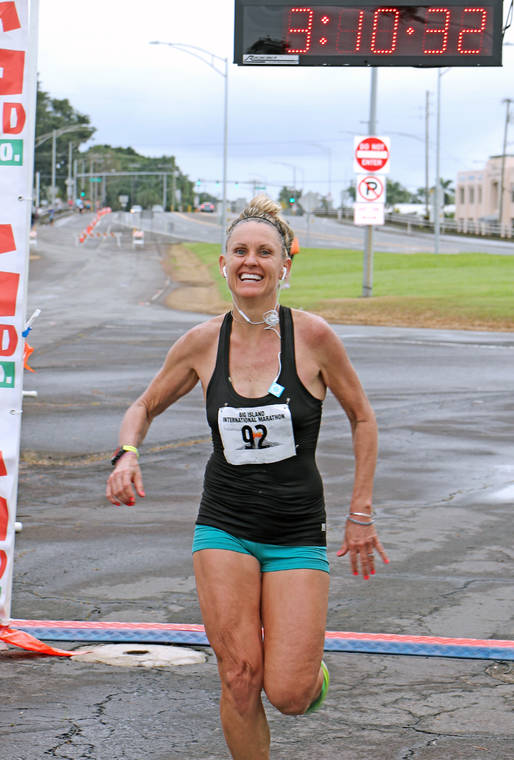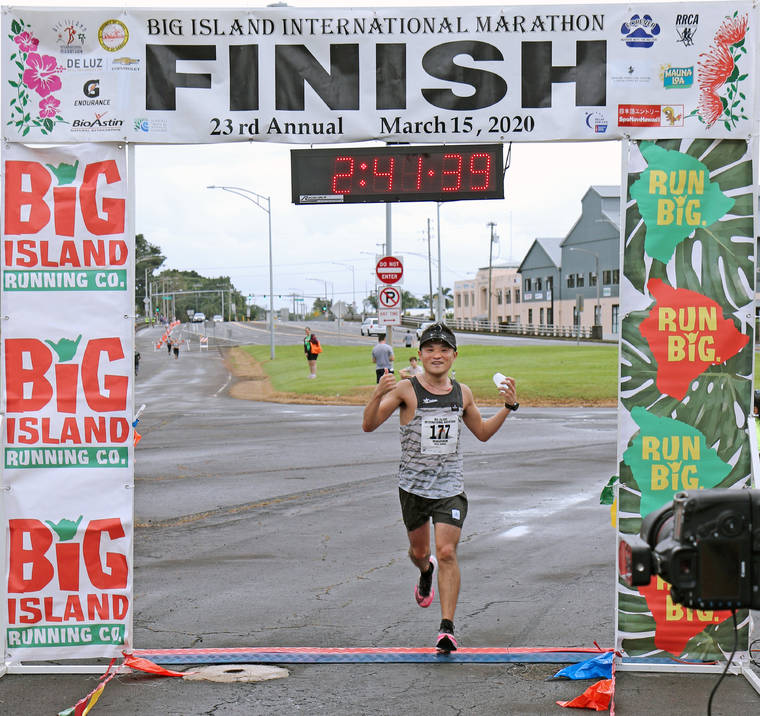Running without fear: Despite 25% dropping out, Hilo marathon goes off with true international flavor

TIM WRIGHT/Tribune-Herald Kailua-Kona's Bree Brown was the first female finisher at Sunday's Big Island International Marathon, crossing in 3 hours, 10 minutes, 32 seconds.

With a time of 2:41 Yosuke Maeda won Sunday’s Big Island International Marathon. Photo: Tim Wright
The 23rd edition of the Big Island International Marathon looked and felt like any of the previous ones. No one crossed the finish line on Sunday at Hilo Bayfront wearing a face mask and volunteers werent wearing face protection either.
The 23rd edition of the Big Island International Marathon looked and felt like any of the previous ones. No one crossed the finish line on Sunday at Hilo Bayfront wearing a face mask and volunteers weren’t wearing face protection either.
But it wasn’t really normal, not with the coronavirus raging around the world, shutting down high school sports, college sports, professional sports and other running events, including the Lavaman Waikoloa Triathlon and the Boston Marathon.
ADVERTISING
There was a pull-out of about 25% from the 900 registered sign-ups, according to race director Bob Wedeman, who noted there was only one modification. Finishers were handed medals instead of getting it draped around their necks.
There were runners from all over, including Japan, the Czech Republic, Australia, Germany, Canada, New Zealand, New York, Massachusetts, Florida, Wisconsin, South Carolina, Chicago, San Francisco, Arizona, Nevada, Oregon, Utah, Texas, and Ohio.
Living up to its name, the race was truly an international event.Yosuke Maeda won the race in 2 hours, 41 minutes and 40 seconds, coming close to the record time of 2:37:13, set in 2016 by Oregon’s Sam Settelmeyer.
Christopher Rayder, a UH-Hilo accounting student from Tennessee, was second in 2:53:17, Honolulu’s Andrew Yourckel was third in 2:57:42, and Kailua-Kona’s Jacob Fansler was fourth in 2:58:44.
Kailua-Kona’s Bree (Wee) Brown was the first female in 3:10:32.
“I’m happy, but it was tiring,” Maeda said in limited English. “There was good nature to see and so many people cheered.”
He’s run in 78 marathons and won 10 times.
Maeda arrived in Hilo on Saturday with his wife and 7-month-old baby. It was his first Hilo marathon, and the family will vacation on Oahu for a week.
The family takes precautions to wash their hands. And neither Maeda’s wife nor the baby was wearing a face mask.
Like Maeda, it was also the first Hilo marathon for Rayder, who figured early on that his Japanese competitor would be too tough to catch.
“It was so much fun,” Rayder said. “I was trying to hang with the first-place guy, but he’s a great runner, and I wasn’t able to do it today. I really enjoyed the course and had a blast out there. The support out there was great.
“I was really happy to come out here and get second place. About mile 14, he pulled away from me. We were really working the hills, and I was like if this guy keeps going I’m not going to be able to hang with him. But that’s running. Sometimes you push yourself harder to see where your limits are, and I did that today. I was proud to finish it out, even though I struggled the last 10 miles.”
Rayder just turned 21 years old, so it was an extra special day for him.
He, too, wasn’t overly worried about the coronavirus situation, even at the starting line when huddled next to so many runners.
“I think it’s time to take some necessary precautions of course,” he said. “But I think you have to take calculated risks. You can’t just put a hold on your life and coming out to this race and supporting it, the community is showing that the virus is not going to hold us down. This race is a testament to the people of Hilo supporting this cause, and I’m really proud of everyone for coming out here and supporting this.”
As an accounting major, Rayder is good with numbers and cracked the coveted three-hour barrier.
“I’m in accounting and numbers are right up my alley,” he said. “I was doing hand sanitizer all week right before the race. When were on the flight, Kleenex and wipes all over the place, making sure we take all the necessary precautions.
“I was a little nervous at the start. It’s a long way to go and you never know what’s going to happen. It worked out great.”
Fansler was second in 2018 but had a slower time in 3:07:38. But he took a more strategic approach this time around.
“This year, there was a little bit more competition,” he said. “I went out a little bit smarter in the first half and finished a lot faster. You’ve got to be smart about the hills and then utilize the downhills, so you can keep that pace going and don’t burn yourself out.”
Fansler knows better than most how the coronavirus is affecting the island’s economy. He works at Waikoloa Hilton and has watched tourists stay away in droves.
“We’re definitely feeling a bit hit. We’re closing down a lot,” he said. “It’s pretty tough right now.
“I’m concerned about the virus, but we’ll be fine as long as we take care of yourselves, get sunlight, exercise, eat healthy, and wash your hands. The one thing they talk about that the virus can’t stand is heat, healthy people, and sunlight. That’s what the doctors are telling me, so events like this are pretty necessary at this time.”


